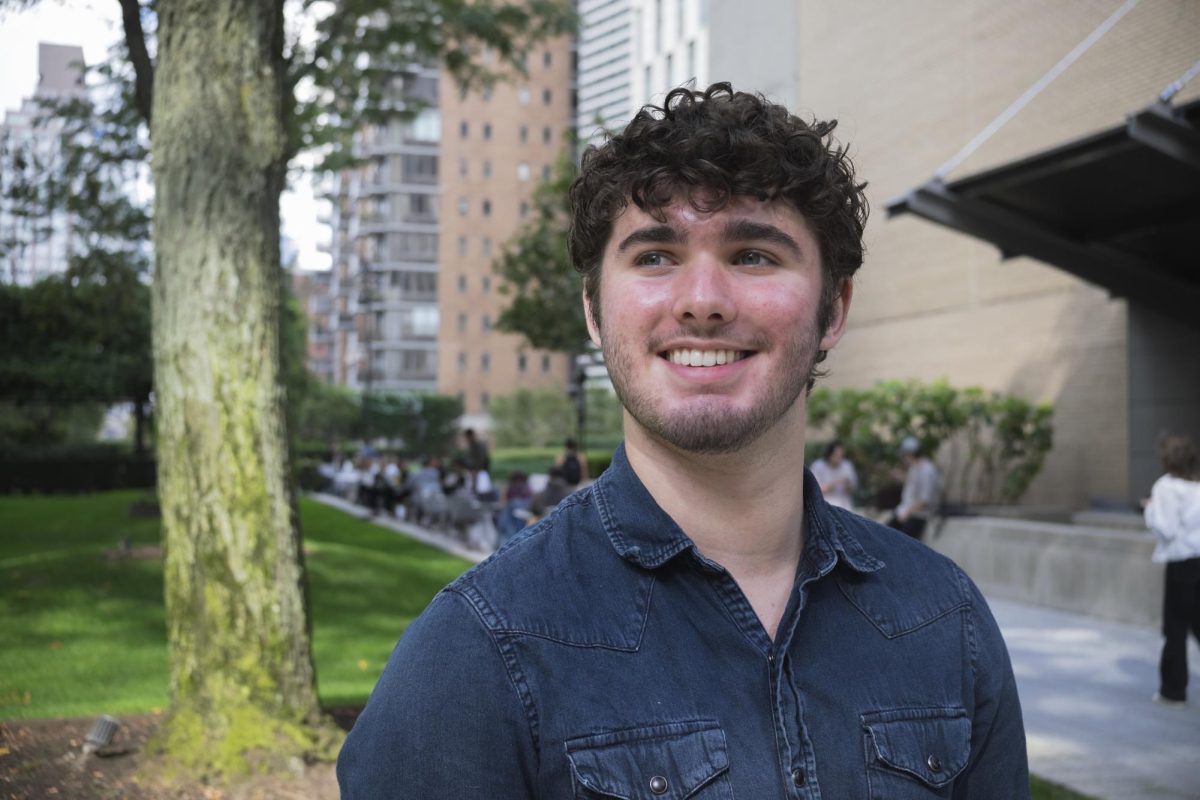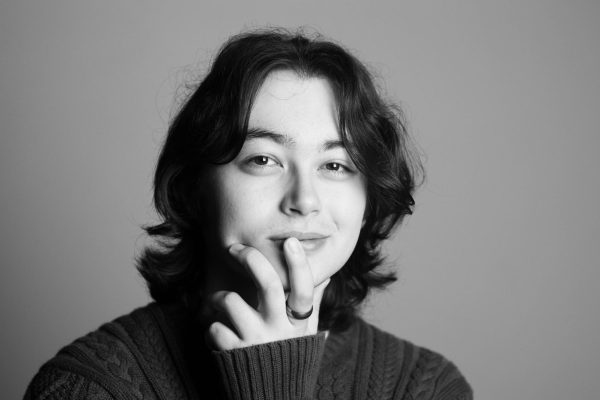John Stengel, Fordham College at Lincoln Center (FCLC) ’26, is the only student in Fordham’s Fall 2025 Studio Showcase to both write and direct the same play. “Birdwatching” explores the intersection between humanity and technology, highlighting responsibility over the creation and use of artificial intelligence (AI), and it all stems from Stengel’s personal experiences.
Growing up in Wilmington, Delaware, Stengel was always interested in theater. He starred in his preschool production of “Where the Wild Things Are” and continued his passion for community theater through high school. At Fordham, Tony Meneses, the former head of playwriting in the theater department, encouraged Stengel to apply for Fordham’s theatre program after his first year at Fordham.
“It’s been a blessing ever since that moment,” he said, reflecting back on the experience.
The play deals with questions of humanity and love, asking: What happens when our AI feels more human than us?
He views theater as a powerful outlet for his creative energy, and has given his all to his current project, “Birdwatching.”
The screenplay was born two years ago as a class assignment. The play follows Peter, a young Wall Street executive, as he moves into an apartment occupied by his AI fridge. Being lonely and in need of connection, Peter and the AI form a friendship that changes their worldviews. The play deals with questions of humanity and love, asking: What happens when our AI feels more human than us?
With the steady increase of the AI epidemic we currently face, the themes of the play have only gotten more relevant since its inception.
This growing normalization of artificial intimacy makes the play’s questions about human connection and authenticity resonate even more powerfully.
“It’s about how responsible we are for the things we create,” Stengel said.
What once might have felt like speculative commentary now feels eerily close to everyday life. For example, AI-generated products and marketing campaigns are now plastered across subway stations in the form of friendship necklace ads promising companionship through code. This growing normalization of artificial intimacy makes the play’s questions about human connection and authenticity resonate even more powerfully.
While he was able to pull from his own circumstances to breathe life into his writing, he also gained new experiences through the creative process
Stengel said that the friendship between the play’s main character, Peter, and the AI being, Bot, was inspired by his relationship with his younger sister.
“You don’t know how much you influence the other person until you see it make an impact,” he said.
Stengel has experienced firsthand how something minuscule he expresses can be internalized by his younger sister and manifested in the way she acts or things she says without his realizing it.
While he was able to pull from his own circumstances to breathe life into his writing, he also gained new experiences through the creative process. This was especially prevalent when it came to figuring out the complications of being both the writer and director of the play. The writing aspect was a continuous process throughout the past two years, but when it came to balancing his creative work with directing, it called for more effort.
“Luckily, I’ve surrounded myself with a team that’s extremely confident and knows what they’re doing,” Stengel said.
By finding a good group of people who can take on responsibility and support him throughout the process, his stress was lifted. It allowed him to view the director role as an opportunity to hear others’ perspectives and creative ideas and then dictate the direction he believes would be best for the show.
“My assistant director Frida is an actor first, so she has this wonderful language that she uses with the actors,” Stengel said. “Oftentimes, I don’t understand a note she gives, then we implement it and it works.”
“I’m much more interested in that sort of sibling dynamic. What do we pass down to the people that grow up around us?” John Stengel, FCLC ’26
As for the writing process itself, Stengel managed to give the AI its own character in a meaningful way.
Stengel wanted to know: “What would it take for me to feel like a fridge was more human than a man?” The human qualities he drew on were things like humor and the ability to learn, reflecting on what he knows about human beings and the values we carry.
Another part of this development was especially emphasizing the sibling-like relationship as opposed to a romantic one. Stengel referenced the 2013 movie “Her” about a man named Theodore and his blossoming relationship with an AI operating system. Instead of taking that route with “Birdwatching,” Stengel wanted to put a twist on the expected trope.
“I’m much more interested in that sort of sibling dynamic,” Stengel said. “What do we pass down to the people that grow up around us?”
It translates well if what I was able to see during a rehearsal is anything to go by. The dynamic between Cade Parker, FCLC ’26, and Eva Vila, FCLC ’28, is humorous as well as deep and meaningful. Parker’s character, Peter, teaches and mentors Vila’s character, Bot, while still maintaining fun banter.
“Birdwatching” contributes to the conversation about the detrimental effects of AI and modern-day technology in a nuanced way. Stengel does not want to warn people off AI altogether, but based on current headlines relating to AI use and its effect on people’s livelihoods, he does believe in promoting mindfulness.
“The play is trying to refocus the conversation to what is our responsibility in creating these (technologies),” he said. “Hopefully the audience recognizes that relationship … and understands their culpability in the way that they act.”
You can see “Birdwatching” in the Kehoe Studio Theatre from Oct. 9-11.


